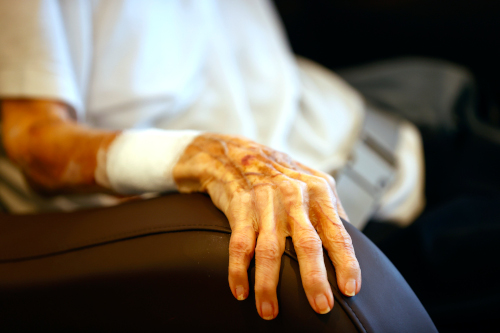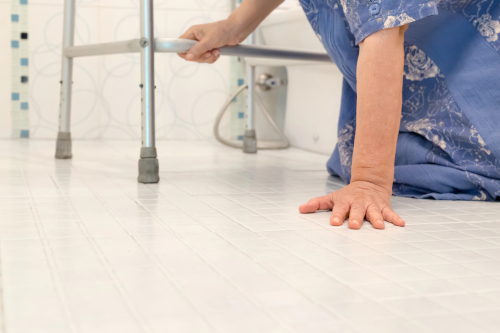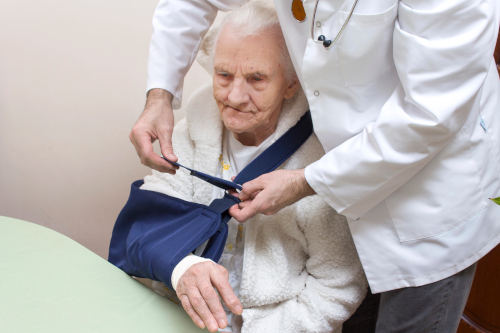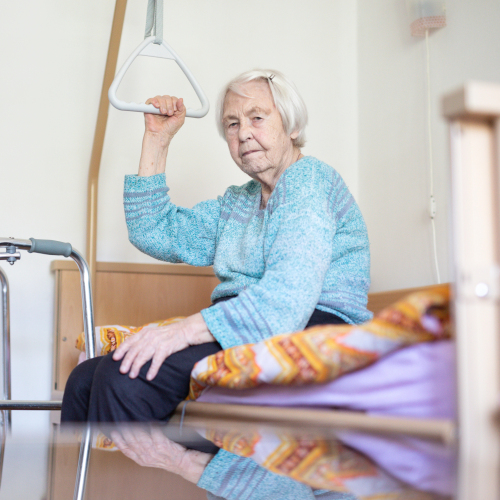The Nursing Home Law Center is committed to providing the legal resources necessary to hold negligent facilities accountable.
Nursing Home Injuries Lawyer
Nursing home injuries can have a profound and lasting impact on elderly residents. When you have a loved one moved to a nursing home, you’re entrusting the staff there to protect and care for them. Whether they’re there for a short-term stay or longer, you expect them to receive the highest quality of care. Unfortunately, far too many residents are being injured while at a facility.
Sometimes, these injuries are caused by negligent behavior and other times, they may even be intentional. Knowing the most common nursing home injuries can help you better protect and advocate for your loved one. You deserve to be compensated for injuries that occur while in a nursing home; we can help.
Recent Settlements for Serious Injuries While In A Nursing Home
$750,000 Settlement: An elderly resident suffered a broken leg due to a fall in a nursing home, leading to a significant settlement.
$1,700,000 Settlement: A nursing home fall resulted in a subdural hematoma and hip fracture for a resident, culminating in a substantial settlement.
$1,200,000 Settlement: A disabled woman sustained injuries in a nursing home van accident, leading to a significant settlement.
$12,800,000 Verdict: A nursing home abuse case involving untreated bed sores led to a patient’s death, resulting in a substantial verdict.
These settlements demonstrate the severe impact that common nursing home injuries can have on residents and their families. Understanding what constitutes a nursing home injury is the first step in recognizing, preventing, and addressing these incidents.
Definition of Nursing Home Abuse Injuries
Nursing home residents can suffer many injuries. Injuries can be physical, emotional, or psychological and negatively affect residents’ quality of life and safety while under the care of a nursing home. Nursing home employees, such as certified nursing assistants (CNAs), can be a source of emotional and psychological abuse, which can lead to anxiety and depression among residents.
These injuries can result from accidents, staff negligence, systemic failures, or intentional abuse. However, proper attention and care can likely prevent accidental injuries or those caused by environmental hazards.
The Role and Quality of Care Nursing Homes Should Provide
Every nursing home is responsible for providing residents with professional, compassionate, and comprehensive care. Any care provided is designed to maintain or improve the residents’ health, dignity, and overall quality of life. This can include:
- Proper medication management
- High-quality medical care
- 24-hour supervision and nursing care
- Social and recreational activities
- Nutritious meals and adequate hydration
- Clean and safe living conditions
- Assistance with activities of daily living (ADLs)
- Regular medical assessments
- Emergency response capabilities
Unfortunately, many facilities fall short and fail to prevent nursing home injuries.

Causes of Nursing Home Injuries
Many nursing home abuse injuries result from avoidable factors within the control of nursing home staff or management. By recognizing these causes, you can better advocate for safer living conditions and quality care.
Negligence and Carelessness
Neglect is one of the leading causes of injuries in nursing homes. Residents can suffer serious harm when staff members fail to provide essential care. Examples of negligence include:
- Failure to reposition immobile residents leads to pressure ulcers
- Inadequate monitoring of residents prone to falls
- Delays or errors in administering medications
- Ignoring signs of dehydration, malnutrition, or other medical needs
Understaffing and Inadequate Training
Many nursing homes operate with fewer staff than required to provide proper care. Staff members may be overworked or lack the appropriate training to handle the specific needs of residents. Understaffing leads to:
- Delays in responding to calls for help
- Overlooking health issues or changes in a resident’s condition
- Improper use of restraints or rough handling
- Increased risk of medication errors
Poor Facility Maintenance and Safety Hazards
Unsafe living environments contribute significantly to injuries. A poorly maintained facility can create dangerous conditions that harm residents. Common safety hazards include:
- Slippery floors, cluttered walkways, or uneven surfaces
- Broken or improperly adjusted bed heights
- Inadequate lighting in hallways or rooms
- Broken wheelchairs, lifts, or medical equipment
Intentional Abuse and Exploitation
Unfortunately, some injuries result from deliberate abuse by staff or other individuals within the facility. This type of harm can be physical, emotional, or sexual. Causes of intentional abuse include:
- Poor supervision of staff and other residents
- Lack of background checks on employees
- Failure to report or address previous incidents of abuse
Systemic Failures in Management
Nursing home injuries often occur due to management-level failures, including a lack of proper policies, procedures, or oversight. Examples of systemic shortcomings include:
- Poor hiring practices and insufficient training
- Failure to implement fall prevention protocols
- Inadequate monitoring of food, water intake, and medical care
- Non-compliance with state and federal regulations
Addressing these root causes can help nursing homes take proactive steps to reduce the risk of injuries and create a safer environment for residents.

Common Types of Injuries in Nursing Homes
When you understand the various injuries a resident can suffer in a nursing home, such as spinal injuries, you’ll be better prepared to protect their rights with early intervention.
While nursing homes often have higher risks of severe injuries, an assisted living facility also presents its own set of injury risks, though they may differ in nature. Residents can suffer minor to serious injuries, all impacting their lives. Each injury needs attention and can seriously affect the residents’ physical and mental health.
Pressure Ulcers
Nursing homes are known for dealing with pressure ulcers and bedsores. These develop when a resident is left in the same position for too long without repositioning, which decreases blood flow. When nursing home residents suffer from pressure ulcers that are not adequately treated, it can lead to medical issues like:
- Bone and joint infections
- Severe tissue damage
- Increased risk of death
- Sepsis in advanced cases
Bedsores can be prevented with regular repositioning, proper equipment, and proper nutrition. If a resident develops a bedsore, early intervention is key to protect vulnerable residents and avoid declining health status.
Falls
Falls are among the most common nursing home facility injuries and the most dangerous for older adults. When nursing home residents fall, it can result in specific, such as:
- Broken bones, especially a hip fracture
- Severe bruising and internal bleeding
- Head injuries and traumatic brain damage
- Increased fear and anxiety about moving
- Loss of mobility and independence
- Spinal injuries
If a resident falls, it can be for several reasons. Common risk factors for fall-related injuries in nursing homes are:
- Improper bed heights
- Mobility issues
- Muscle weakness
- Poor lighting or facility maintenance
- Inadequate supervision or assistance
- Slippery floors
- Balance problems
- Side effects from medications
Many nursing homes have fall prevention protocols to help reduce and prevent fall-related injuries. Even with these protocols, nursing facilities must be vigilant to keep walkways clear and monitor residents.
Medication Errors
Not everyone realizes that medication errors are considered injuries in nursing homes. When there’s a medication error, it can have devastating consequences. Common issues seen in nursing homes include:
- Over-sedation
- Incorrect medication administration
- Missing criteria medications
- Harmful drug interactions
- Wrong dosage or timing
Medication injuries compromise the resident’s medical care and can lead to life-threatening medical conditions, hospitalization, or sometimes death. Nursing homes must have proper medication management and documentation protocols to help prevent medication errors. These errors may be nursing home negligence.
Malnutrition and Dehydration
Everyone needs proper nutrition and hydration, and residents in a nursing home setting rely on staff to help them with this necessity. Nursing home injuries can happen due to malnutrition and dehydration and cause other issues like:
- Weakness and fatigue
- Unexplained weight loss
- Dry skin and mucous membranes
- Delayed wound healing
- Confusion and disorientation
- Increased susceptibility to infections
Nursing homes must monitor food and water intake regularly, especially for residents who need assistance eating and drinking.
Physical and Emotional Abuse
Injuries from physical and emotional abuse are far too common in nursing homes. Forms of physical and emotional abuse are:
- Neglect of basic needs
- Hitting, rough handling, or pushing
- Isolation or social restriction
- Inappropriate use of restraints
- Verbal threats and intimidation
- Humiliation or degrading treatment
The impacts of nursing home abuse extend far past the physical injuries. These can lead to lasting psychological trauma, impeding the resident’s ability to focus on maintaining or improving their health status.
Sexual Abuse
Sexual abuse in nursing homes is alarming and often goes unreported or noticed. This type of abuse can take many forms, including:
- Sexual harassment
- Forced nudity
- Sexual assault or rape
- Unwanted fondling or touching
- Taking explicit pictures of residents
Every resident is vulnerable to sexual abuse, particularly those with cognitive impairments, as it’s easier for abusers to manipulate them. Nursing home staff must have robust prevention protocols and reporting procedures.
Signs of Nursing Home Abuse and Neglect
Not all abuse has physical signs you’ll see immediately. Family members play a crucial role in identifying and addressing signs of abuse in nursing homes. Knowing what to look for in nursing home settings is essential for anyone who has a family member or loved one in a nursing home.
Physical Signs
Spotting physical injuries in nursing homes tends to be the easiest. Knowing the signs of elder abuse can help you ensure you’re making sure your loved one is being taken care of:
- Pressure ulcers
- Sudden head injury
- Unexplained bruises, burns, or cuts
- Unusual weight loss
- Broken bones, severe fractures, or sprains
- Dehydration and malnutrition symptoms
- Bruising around wrists and ankles suggests improper use of physical restraints
- Poor personal hygiene
- New, unexplained medical conditions
Severe cases can result in serious injuries and even death. Contact local authorities if your loved one is injured and needs immediate medical attention. Many residents are scared to report staff, such as registered nurses, for abuse because they fear adverse consequences.

Emotional Signs
Being in a nursing home can significantly affect a resident’s behavior. While that’s common, be on the lookout for sudden and prolonged signs of emotional neglect that are not age-related changes, like:
- Mood swings
- Sudden depression and anxiety
- Unusual fearfulness, especially around certain staff members
- Loss of interest in hobbies or social interaction
- Signs of Post-Traumatic Stress Disorder (PTSD)
Behavioral Signs
When a nursing home resident has sudden behavioral changes, it can indicate a more significant problem. Behavioral changes that might indicate nursing home abuse or neglect include:
- Rocking or other self-soothing behaviors
- Aggression or agitation
- Regression in physical and mental abilities
- Reluctance to speak openly, especially around certain nursing home staff members
- Unusual sexual behavior
- Changing in sleeping patterns like insomnia or nightmares
Weight Loss or Malnutrition
Even if a resident chooses not to eat, it’s the nursing home’s responsibility to ensure that they’re getting proper nutrition and hydration. Signs that your loved one is suffering from malnutrition include:
- Frequent illness
- Sudden or drastic weight loss
- Weakness and lethargy
- Sunken cheeks and eyes
- Dental problems
- Clothes are too loose
If you suspect abuse, it is crucial to intervene quickly and document the incident.
How to Report Nursing Home Abuse
If you suspect nursing home abuse, take immediate action using these key steps:
- Contact the Facility Administrator: Report the abuse to the nursing home’s management so they can intervene immediately.
- Reach out to the Long-Term Care Ombudsman Program: Ombudsmen advocate for nursing home residents and can help address complaints. For assistance, visit the National Long-Term Care Ombudsman Resource Center or call 1-800-677-1116.
- File a Complaint with Your State’s Health Department: Each state’s health department investigates complaints about nursing home violations. Find state-specific contact information through the Centers for Medicare & Medicaid Services (CMS).
- Report to Adult Protective Services (APS): APS investigates abuse and neglect cases. To locate your local APS, call the Eldercare Locator at 1-800-677-1116.
- Contact the National Center on Elder Abuse (NCEA): For general guidance and resources on reporting abuse, visit ncea.acl.gov or call 1-855-500-353

State and Federal Laws Protecting Nursing Home Residents
Federal and state laws protect nursing home residents’ rights to quality care, dignity, and freedom from abuse. These legal frameworks mandate that facilities uphold specific standards to promote their well-being.
Right to Quality Care
Under 42 CFR § 483.10 of the Federal Nursing Home Reform Act, residents are entitled to:
- Proper medication management
- Regular medical assessments
- Appropriate medical care
- Individualized care plans
- Adequate supervision
- Professional and competent care
- Adequate staffing levels
- A clean and safe living environment free from safety concerns
These provisions ensure that nursing homes deliver services that meet professional standards and cater to the individual needs of each resident.
Right to Dignity and Respect
The same federal regulation, 42 CFR § 483.10, guarantees residents the right to dignity and respect, which includes:
- Participation in care decisions (if cognitively able)
- Privacy during personal care
- Consideration of cultural and religious preferences
- Respect for personal preferences
- Maintenance of personal relationships
- Freedom to make their own medical and personal choices
These rights empower residents to maintain autonomy and personal identity within the nursing home sight to Be Free From Abuse and Neglect
Federal law explicitly protects residents from abuse and neglect. According to 42 CFR § 483.12, nursing homes must ensure that residents are free from:
- Physical abuse and improper use of restraints
- Emotional and psychological abuse
- Sexual assault and abuse
- Discrimination
- Neglect of basic needs
- Financial exploitation
- Retaliation for complaints
Facilities must implement policies and procedures to prevent abuse, investigate allegations, and report incidents to appropriate authorities.
State-Specific Protections
In addition to federal regulations, states have laws safeguarding senior citizens in nursing homes. In Illinois, for example, elderly persons are protected under the Illinois Nursing Home Care Act (210 ILCS 45), which ensures their rights to quality care, dignity, and freedom from abuse.
Tennessee Code Title 68, Chapter 11, Part 9 outlines residents’ rights in Tennessee. The specifics vary by state, but most states have additional laws to protect elderly patients in assisted living and nursing facilities.

The Role of a Nursing Home Injury Lawyer
Nursing home injury lawyers, particularly those who understand elder law, can be invaluable when you pursue compensation.
How Long Do You Have to File A Claim?
The statutes of limitations to file a nursing home injury claim vary by state. In some states, like Kentucky and Tennessee, you only have one year to file a claim, so it’s essential to speak with a nursing home abuse lawyer immediately to ensure you don’t miss the deadline.
Investigating the Incident
An experienced elder or nursing home abuse lawyer is invaluable when helping build your case. They’ll thoroughly investigate the situation, including:
- Identify regulatory violations
- Gather and analyze medical records, including medical bills
- Consult with medical experts to support your claims
- Interview staff, other residents, and any potential witnesses
- Review facility procedures and policies
- Document evidence of abuse or negligence
Building a Strong Case
Based on what you’ve told them and the findings of their investigation, your attorney will then build a compelling case for you or your loved one. Building a solid case involves:
- Establishing the standard of care
- Demonstrating how the nursing home didn’t meet that standard of care
- Documenting all damage and injuries incurred
- Securing expert testimony
- Identifying all the liable parties (staff members, administration, the nursing home, etc.)
- Preparing all the evidence for the presentation
Negotiating With Insurance Companies
When you file a personal injury claim for nursing home abuse or neglect, dealing with insurance companies can bring a lot of stress. Experienced personal injury lawyers will negotiate with the insurance companies on your behalf because they understand:
- Insurance company’s tactics to reduce payouts
- Settlement negotiation strategies to ensure maximum compensation for damages
- Fair compensation values based on the specific injuries incurred
- Timeline management
- Protection of client’s interests and rights
- Documentation requirements
Litigating the Case
Ideally, your lawyer and the liable parties can settle your claim out of court. If necessary, your lawyer will handle the litigation of your case. This includes:
- Filing necessary legal documentation
- Representing you in court proceedings
- Cross-examining witnesses
- Presenting evidence effectively
- Arguing your care in front of a judge and jury
- Protecting your rights and interests throughout the legal process
Hire An Experienced Nursing Home Injury Law Firm
Nursing homes and staff are responsible for caring for all residents, including finding ways to prevent nursing home injuries. While some injuries are accidental, proper patient safety protocols can stop them.
If you or a loved one have suffered an injury while at a nursing home, you’re not alone. Whether it was a minor or serious injury, the Nursing Home Law Center is here to help you hold the party accountable. We understand what common injuries are in nursing homes and how to protect the rights of injured residents during their stay. Don’t let nursing home negligence get brushed under the rug.
Contact us today for a free consultation by filling out our online form or calling (800)-926-7565.
Common Nursing Home Injuries

